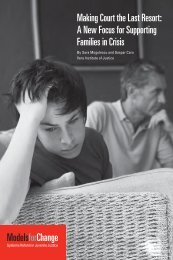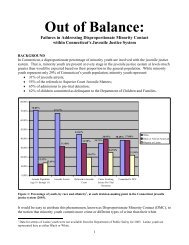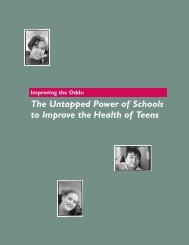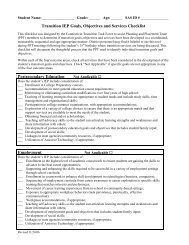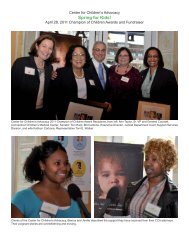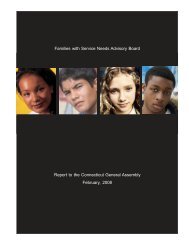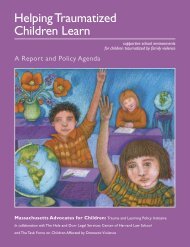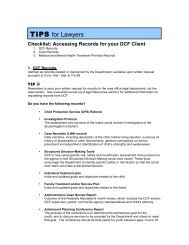Utility Access and Health - Center for Children's Advocacy
Utility Access and Health - Center for Children's Advocacy
Utility Access and Health - Center for Children's Advocacy
Create successful ePaper yourself
Turn your PDF publications into a flip-book with our unique Google optimized e-Paper software.
Problems Run Deeper: Need <strong>for</strong> Regulatory ChangeAs some of the leading utility access programs in thearea, the staffs at NCLC, ABCD <strong>and</strong> MLP | Boston wereamong the first to hear in early 2008 that the MassachusettsDepartment of Public Utilities (DPU) was reevaluating its existing regulations. When they heardthis news, each program started preparing a <strong>for</strong>malrecommendation to submit during the public commentphase of the evaluation.Because state public utility commissions operateindependently, it is sometimes difficult to predictwhen an opportunity to affect public policy will openup in a given state, Harak says. When it comes tofinding the right time to act, his best advice to healthcare providers is to work closely with advocates morefamiliar with the utility commission.“It’s often obvious to advocates when there mightbe a window of opportunity to score some big picturepolicy changes,” he says. “But it would be much harder<strong>for</strong> those in the medical establishment to see whenthose windows open.”Tobin has similar advice <strong>for</strong> those looking to impactpolicy, stressing the importance of communicatingwith local <strong>and</strong> state commissions. “We always wantto keep in touch with the Department of Public Utilities,”she says. “It is the body that can ultimately havethe most leverage in pushing the utility companies inthe direction that is most helpful to the consumer. Youhave to know how they want things to be done, workaround how they do things, <strong>and</strong> make yourself availableaccording to their schedule.”Mindful of the deadline <strong>for</strong> providing public commenton the DPU investigation, the MLP | Boston teamstarted preparing written testimony documenting thenegative health impact of some current utility regulations.The resulting 10 page document proposedspecific ways to streamline the system, such as creatinga common set of <strong>for</strong>ms <strong>for</strong> each utility company to use.The MLP | Boston testimony drew upon the clinicalexperience of BMC doctors to highlight the healthimpacts of utility practices:“These administrative burdens result in only a fraction ofeligible families getting the protections they are eligible<strong>for</strong> by law, <strong>and</strong> this results in such unnecessary healthhazards as families <strong>for</strong>egoing utility service duringwarmer months instead of engaging in the recertificationprocess, only to find that service cannot be restoredwhen it gets colder because the family is no longerconsidered a customer… This increases homelessnessrisk <strong>and</strong> harms health, especially <strong>for</strong> those with medicalconditions particularly dependent on safe climatecontrol (e.g. asthma, diabetes <strong>and</strong> sickle cell disease).”Along with submitting written testimony, Flacksattended multiple public DPU hearings on the investigation.At the hearings, she heard what the utilitycompanies said about the proposed changes. Whenshe submitted additional comments in the next phaseof the investigation, she was able to piggyback on someof the arguments made by utility company executives:… As Ms. Penni Connor, NSTAR’s Customer Care VicePresident, testified at the hearings, it is important thatwe conclude this investigation with a “bias <strong>for</strong> action”because we are indeed confronting a real time emergencythat other commenters have documented indetail, <strong>and</strong> that the Department has already recognizedby convening this investigation.… [MLP | Boston] urges the Department to heed the wellreasoned comments of panelists…[including] Ms. AmySmith of National Grid who oppose any changes thatwould deliberately or inadvertently put up more barriersto accessing medical protection…



